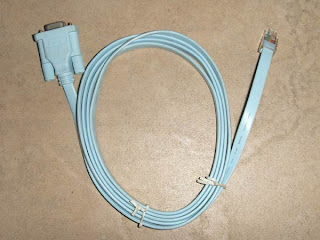 If you have worked with Cisco devices for some time, you must have heard about ROMMON or ROM Monitor.
If you have worked with Cisco devices for some time, you must have heard about ROMMON or ROM Monitor.ROMMON or also known as bootstrap program is you can say a mini operating system in the Cisco devices that helps to initialize the processor hardware and boot the operating system software (Cisco IOS).
Since it's only a mini OS that has a very limited set of commands you can't do any configuration such as configuring routing, ip addressing, etc from ROMMON.
But the power of the ROMMON is that you can do very useful things such as password recovery procedure when you forgot your password to the devices, downloading softwares through serial connection, and upgrading your Cisco IOS.
Now why did I put an image of console cable up there? It's because you can only access the ROMMON using the console connection i.e. through terminal monitor.
You can access the ROMMON mode by changing the configuration register of the device using the break button on your keyboard.
Or if you're using laptops, you usually have limited set of keys in the keyboard right? So you have to use the Ctrl + Function Button + Break Button.
As quoted from the Cisco docummentation:
Break (system interrupt) is always enabled for 60 seconds after the router reboots, regardless of whether it is configured on or off in the configuration register. During this 60-second window, you can break to the ROM monitor prompt by pressing the Break key.
After issuing the break command, you'll be taken to the following screen (might different on all devices):
System Bootstrap, Version 11.3(2)XA4, RELEASE SOFTWARE (fc1)
Copyright (c) 1999 by cisco Systems, Inc.
TAC:Home:SW:IOS:Specials for info
C2600 platform with 24576 Kbytes of main memory
program load complete, entry point: 0x80008000, size: 0x2f8558
Self decompressing the image : ##############################PC = 0xfff0a530, Vector = 0x500, SP = 0x817ff8b0
monitor: command "boot" aborted due to user interrupt
rommon 1 >
As I said before, you can't do anything much from the ROMMON mode, let's see what commands are available using the ? command:
rommon 1 > ?
alias set and display aliases command
boot boot up an external process
break set/show/clear the breakpoint
confreg configuration register utility
cont continue executing a downloaded image
context display the context of a loaded image
cookie display contents of cookie PROM in hex
dev list the device table
dir list files in file system
dis display instruction stream
dnld serial download a program module
frame print out a selected stack frame
help monitor builtin command help
history monitor command history
meminfo main memory information
repeat repeat a monitor command
reset system reset
set display the monitor variables
stack produce a stack trace
sync write monitor environment to NVRAM
sysret print out info from last system return
tftpdnld tftp image download
unalias unset an alias
unset unset a monitor variable
xmodem x/ymodem image download
If you want to go back to the router/switch mode just use the following command:
rommon 1 > reset










